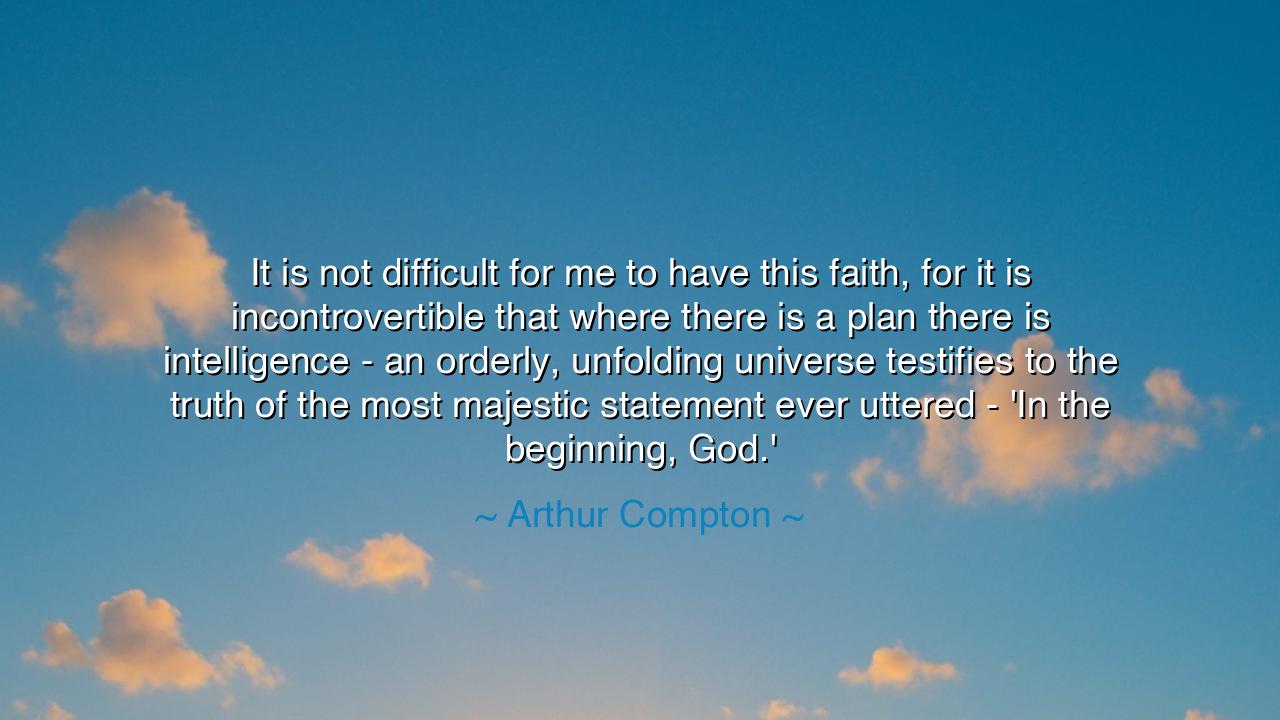
It is not difficult for me to have this faith, for it is
It is not difficult for me to have this faith, for it is incontrovertible that where there is a plan there is intelligence - an orderly, unfolding universe testifies to the truth of the most majestic statement ever uttered - 'In the beginning, God.'






The physicist and Nobel laureate Arthur Compton, a man of both scientific brilliance and spiritual depth, once wrote: “It is not difficult for me to have this faith, for it is incontrovertible that where there is a plan there is intelligence — an orderly, unfolding universe testifies to the truth of the most majestic statement ever uttered — ‘In the beginning, God.’” In these words, Compton bridged the ancient divide between faith and reason. He spoke not as a theologian alone, nor as a scientist only, but as one who had glimpsed both the mysteries of creation and the laws that govern it. His declaration is a song of reverence — the confession of a mind that saw in the vastness of the cosmos the unmistakable signature of divine intelligence.
Compton lived in the twentieth century, an age of great discovery and great doubt. He was among those who unraveled the secrets of light and energy, who proved that the photon — that small particle of radiance — carried within it both wave and matter, a paradox made manifest. Yet the more he learned, the more he believed. To him, the order of the universe was not the product of chance but of design; the symphony of the stars was too harmonious to be the echo of chaos. His faith did not arise in ignorance of science, but because of it. He saw in every law of physics the trace of a higher mind, a cosmic intelligence that wrote existence into being with mathematical grace and spiritual purpose.
When Compton speaks of a plan, he speaks as the ancients once did — of the great order, the Logos, the divine reason that shapes all things. Long before the language of atoms and galaxies, the sages of Greece and the prophets of Israel had perceived that the universe was not random but intentional. “In the beginning, God,” they declared — not as poetry, but as revelation. Compton, gazing through the lens of science, found himself arriving at the same sacred threshold. The discoveries of his century did not erase the Creator; they magnified Him. In the elegance of natural law, in the precision of cosmic order, he saw the unfolding of a will both infinite and intimate.
Consider, as a reflection of his meaning, the story of Johannes Kepler, another scientist of faith from centuries before. Kepler spent years studying the movements of the planets, tracing their orbits in endless calculation. When he finally discerned the hidden laws that governed their motion, he is said to have fallen to his knees in awe, whispering, “I am thinking God’s thoughts after Him.” That same revelation pulsed in Compton’s heart — that the work of science is not rebellion against God, but communion with His mind. The discovery of order is the discovery of purpose; and purpose, in turn, implies a Planner.
This is the essence of Compton’s faith — that intelligence recognizes intelligence. Just as a craftsman sees design in the tool, or a musician hears harmony in the note, so the scientist perceives in the universe the unmistakable coherence of thought. Randomness does not write equations, nor does accident sustain galaxies in balance. The universe is not an aimless drift through emptiness; it is an orderly, unfolding plan, stretching from the smallest atom to the farthest star. Each particle obeys its law; each orbit keeps its rhythm. Such beauty, such precision, could not be born of nothingness.
And yet, Compton’s words are not a hymn to arrogance, but to humility. To say “In the beginning, God” is to recognize the limits of the human mind — that beyond every discovery lies mystery, beyond every formula lies wonder. The more we understand, the more we are compelled to bow. This is the paradox of wisdom: the scientist who truly sees becomes a worshiper, and the believer who truly contemplates becomes a seeker of truth. Faith and reason, far from being enemies, are twin pillars of understanding — one grounded in experience, the other lifted in awe.
Let this be the teaching, then, to those who walk between science and spirit: Do not fear the questions of the mind, nor silence the faith of the heart. Seek truth in all its forms, and you will find that they converge in the same light. When you behold the night sky, when you marvel at the intricate symmetry of a leaf, when you feel the pulse of life within your chest — know that you are witnessing the work of intelligence beyond all comprehension. The universe is not an accident; it is an invitation. It calls to every thinking soul: to study, to wonder, to believe.
So remember Arthur Compton’s conviction — that faith is not the denial of knowledge, but its highest fulfillment. For to see the plan in creation is to glimpse the mind of its Creator, and to feel within one’s heart the quiet echo of that ancient, majestic truth: “In the beginning, God.” Live, then, as one who walks in that light — thoughtful, humble, and filled with reverence — for every discovery of the world is, in the end, a rediscovery of its divine beginning.






AAdministratorAdministrator
Welcome, honored guests. Please leave a comment, we will respond soon